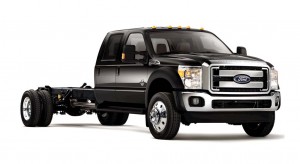
Ford will turn to Azure Dynamics to convert the biggest of its F-Series models into plug-in hybrids.
Can the full-size pickup go from being a gas-guzzling behemoth to the poster child for environmental efficiency? A new partnership teaming up Ford and Canadian-based Azure Dynamics aims to bring the F-Series truck a big step closer to being earth-friendly.
Early in 2013, the partners plan to come to market with a plug-in hybrid version of some of the biggest of Ford’s popular trucks, starting with the F-550 but later adding the F-450 and F-350 models. The technology would allow the trucks to operate in electric-only mode at low speeds while also reducing fuel consumption at higher speeds in hybrid mode.
Azure Dynamics has already been working with Ford on several projects including the battery-powered conversion of the Dearborn maker’s small commercial van, dubbed the Transit Connect Electric, as well as a version of the Ford E-Van converted to hybrid power.
For the moment, the partners aren’t saying much about the specific technology that will replace the conventional F-Series powertrain, though it is likely to be similar to the E-Van conversion, they hint. The modified driveline, called the E-450 Balance, starts out with a conventional Ford 5.4-liter V-8 with a 5-speed automatic transmission. But an electric motor connected to that gearbox provides alternative power in electric drive mode, while also adding battery assist during acceleration. When coasting or braking it goes into regenerative mode to reclaim energy normally lost.
An additional motor mounted ahead of the engine handles accessory drive when the engine is stopped – and can provide stop/start functionality, briefly shutting the motor down instead of idling, then immediately restarting when the driver’s foot lifts off the brake.
Significant details remain to be seen including the anticipated range on battery power, overall fuel efficiency and, of course, the price tag. Like the new Transit Connect Electric, the F-Series Plug-Ins may turn to advanced lithium-ion rather than older, if cheaper, nickel-metal hydride batteries.
(Unofficial details leak out about the next-gen Ford and GM pickup powertrains. Click Here for the inside story.)
The partners are aiming at the same sort of commercial fleet buyers who have been purchasing the E-450 Balance – a list that includes AT&T and Purolator.
Such customers are particular sensitive to the rise in fuel price. But they’re also more likely than individual customers to place their vehicles into controlled operations where they have a good sense of daily use and, thus, a clear sense of whether going plug-in will yield an acceptable payback on the investment in battery power.
Ford has been making a heavy press into electric propulsion — a strategy only likely to accelerate as a result on the new federal fuel economy standards. But the maker has been taking a cautious approach, turning to partners for technical know-how and, in some cases, for the actual production of battery-based models.
The new Focus Electric, for example, relies on technology developed by Canadian mega-supplier Magna International. The Transit Connect Electric, meanwhile, not only uses an Azure Dynamic battery drivetrain but is converted off the Ford assembly line.
Azure, meanwhile, has put an emphasis on partnering rather than following the approach taken by such battery-car start-ups as Tesla Motors and Fisker Automotive, which are hoping to directly challenge the established industry order by producing vehicles entirely of their own design.
(Toyota remains “absolutely” committed to its Tundra full-size pickup. Click Here for that story.)
